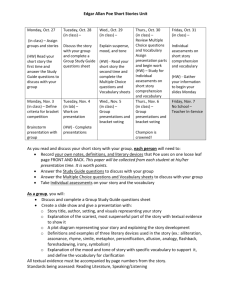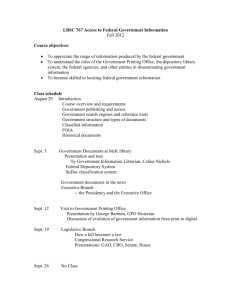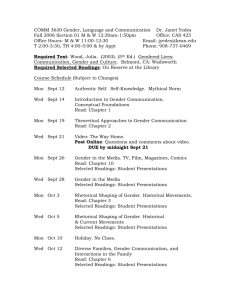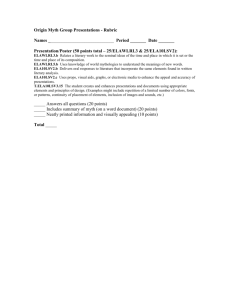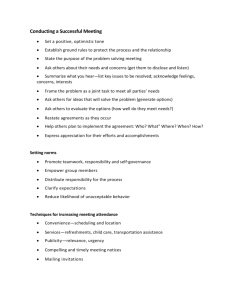PRESENTATIONAL SPEAKING
advertisement
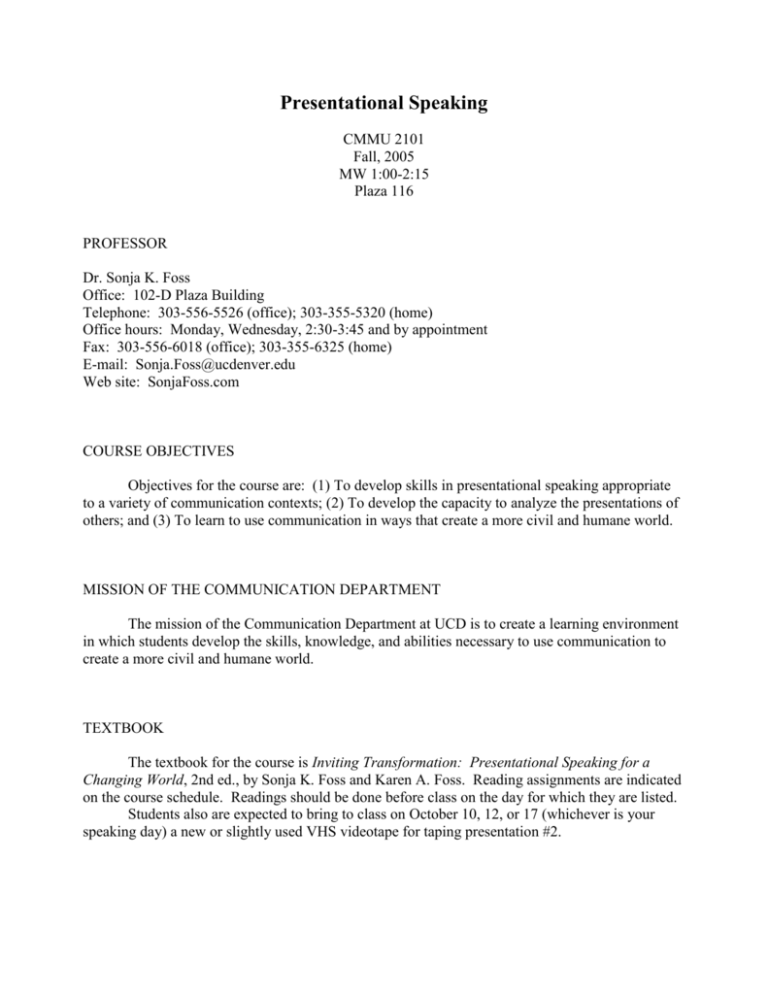
Presentational Speaking CMMU 2101 Fall, 2005 MW 1:00-2:15 Plaza 116 PROFESSOR Dr. Sonja K. Foss Office: 102-D Plaza Building Telephone: 303-556-5526 (office); 303-355-5320 (home) Office hours: Monday, Wednesday, 2:30-3:45 and by appointment Fax: 303-556-6018 (office); 303-355-6325 (home) E-mail: Sonja.Foss@ucdenver.edu Web site: SonjaFoss.com COURSE OBJECTIVES Objectives for the course are: (1) To develop skills in presentational speaking appropriate to a variety of communication contexts; (2) To develop the capacity to analyze the presentations of others; and (3) To learn to use communication in ways that create a more civil and humane world. MISSION OF THE COMMUNICATION DEPARTMENT The mission of the Communication Department at UCD is to create a learning environment in which students develop the skills, knowledge, and abilities necessary to use communication to create a more civil and humane world. TEXTBOOK The textbook for the course is Inviting Transformation: Presentational Speaking for a Changing World, 2nd ed., by Sonja K. Foss and Karen A. Foss. Reading assignments are indicated on the course schedule. Readings should be done before class on the day for which they are listed. Students also are expected to bring to class on October 10, 12, or 17 (whichever is your speaking day) a new or slightly used VHS videotape for taping presentation #2. 2 REQUIRED ACTIVITIES Oral assignments: Discussion facilitation: Students will be divided into small groups to lead one class discussion on some aspect of presentational speaking. The discussion should be 30-35 minutes long. Your task is to share the ideas on your topic(s) in an interactive way. You may use visual aids, handouts, exercises, or any other devices that effectively engage your classmates, motivate them to participate in the discussion, and help them understand and retain the material. You are not expected to lecture the class—you should assume that your classmates have read the chapter or chapters that you are discussing. Your grade will be based on your ability to generate and maintain a lively and thoughtful discussion that is helpful to the class. Dates for these discussions are September 7, 12, 14, and 19. The specific date for each group’s facilitation will be scheduled at the start of the semester. Five major presentations: Five presentations of your choice of the type you are likely to give in your chosen occupation, an occupation you would like to explore, or a life orientation. The presentations should vary, as much as possible, by interactional goal: asserting individuality, building community, articulating a perspective, seeking adherence, and discovering knowledge and belief. Not every occupation will make use of each type of goal, however, and you may not be able to use five different goals in your presentations. Some sample scenarios follow: If you plan to be a high-school teacher and basketball coach, for example, your presentations might include: (1) a pep talk to the basketball team (building community); (2) leading a discussion on Shakespeare with a class (discovering knowledge and belief, articulating a perspective); (3) speaking to a community boosters' group about the current status of the team and urging its support (seeking adherence, articulating a perspective, building community); and (4) discussing with basketball-team members the strategy to use in an upcoming game (discovering knowledge and belief). If you plan to work in environmental advocacy, your presentations might include: (1) encouraging university students to join an environmental organization (seeking adherence); (2) trying to build community among new staff members (building community); (3) testifying before Congress on an environmental issue (articulating a perspective, seeking adherence); and (4) introducing yourself to staff members as the new director of an environmental organization (asserting individuality). If you plan to be an administrator of a public agency or private business, your presentations might include: (1) an overview of what your agency does to a community organization such as the Rotary Club (articulating a perspective); (2) a presentation introducing yourself as the new manager to your employees (asserting individuality); (3) a discussion with your employees about how to solve a particular problem (discovering knowledge and belief); and (4) a sales presentation to a potential customer (seeking adherence). 3 If you are not familiar with the speaking opportunities in the career you intend to enter, you'll want to interview someone in that profession or otherwise discover the types of presentations you are likely to give in that career. The five presentations increase gradually in length through the semester: Presentation #1: 3 min., due Sept. 28 and Oct. 3 Presentation #2: 4 min., due Oct. 10, 12, and 17 Presentation #3: 5 min., due Oct. 19, 24, and 26 Presentation #4: 6 min., due Oct. 31 and Nov. 2, 4, and 9 Presentation #5: 7 min., due Nov. 28 and 30 and Dec. 5 and 7 What-I-want-to-be-when-I-grow-up presentation: A presentation in which you tell what you would like to be when you graduate--the profession you plan to enter when you graduate or in which you are presently employed or a life orientation to which you are committed. The presentation is designed to introduce the context from which you will be speaking for the semester. You might want to discuss such things as what the career entails, what positions within the career you have held or envision for yourself, the possible presentational situations you might encounter in the career, what you plan to accomplish within this career, and the experiences you've had with the career. The presentation should be 1-2 minutes long. It is designed to help you begin to deal with speech anxiety, so it first will be presented to one person in the class, then to a small group, and then to the whole class. This presentation will be given on Aug. 31. If you give the presentation, you will receive a grade of “A” on it. Impromptu presentation: A presentation for which you will have little or no preparation time. This presentation will be given on November 14. If you give the presentation, you will receive a grade of “A” on it. Written assignments: Semester overview: A brief overview of the five types of presentations you plan to give during the semester, specifying the career or orientation that will be the context for the presentations, the kinds of presentations, and the interactional goals you will be trying to accomplish in the presentations. This does not have to be typed. The semester overview is due on September 12. If you complete this assignment satisfactorily, you will receive a grade of “A” on it. You may be asked to re-submit this one or more times until you and the instructor agree on what your presentations will be. If you do not submit this overview or do not re-submit it if asked, you will receive a grade of “F” on this assignment. Self-Evaluation: Written evaluation of your second presentation (approximately 3 pages, typed), based on your review of a videotape of the presentation. (Please bring a videotape on which to record your presentation on the day of your second presentation--October 10, 12, or 17.) Due October 24, 26, or 31, depending on the date of your second presentation. Speaking plans: A speaking plan for each of your five major presentations. A speaking plan includes: (1) audience; (2) setting; (3) interactional goal(s); (4) commitment statement; (5) 4 organizational pattern(s); (6) major ideas; (7) major forms of elaboration; and (8) introduction; (9) conclusion; (10) transitions; and (11) strengths and weaknesses of delivery. See chapter 10 in the textbook for more details about speaking plans. These plans are due on the day that you speak and should be typed. Exam: A closed-book, short-answer exam over the book and lectures. The exam will be on Sept. 26. There will not be an exam during finals' week; your fifth presentation is your final exam. GRADING The final grade for the course will be determined as follows: What-I-want-to-be-when-I-grow-up presentation = 5% Discussion facilitation = 5% Presentation #1 = 10% Presentation #2 = 10% Presentation #3 = 10% Presentation #4 = 10% Presentation #5 = 20% Exam = 10% Self-evaluation paper = 5% Speaking plans (added together) = 10% Impromptu presentation = 5% Attendance will be used to determine the final grade in borderline cases. Criteria for grading presentations: To receive a grade of “A,” a speaker must: Have a clear interactional goal Accomplish the interactional goal Create an environment of safety, value, freedom, and openness Have a clear commitment statement Have clearly identifiable major ideas that are relevant to the commitment statement Have a clear organizational pattern appropriate for the topic and interactional goal Use forms of elaboration sufficient to develop the major ideas Have an introduction that makes clear the topic and interactional goal and begins to create an environment of freedom, safety, value, and openness Have a conclusion that re-emphasizes the main idea of the presentation and clearly conveys what will happen following the presentation Have effective transitions between the introduction and conclusion, between the main points in the body of the presentation, and between the body and the conclusion Adhere to the time limit Have a smooth and flowing delivery that suggests practice Evidence vocal variety to suggest interest in the subject matter Use presentational aids (if any) effectively 5 Have consistent eye contact with the audience Dress appropriately for the presentation Use correct grammar Explain sufficiently any technical terms used in the presentation Evidence few fillers such as “you know,” “uh,” and “like” Frame the presentation invitationally, so that speaker and audience are treated as equals and different perspectives are treated as resources Grades of “B” and “C” will be given according to the number of the above criteria that were not met. POLICIES Registration: September 1 is the last day to add courses via the web SMART system. September 7 at 5:00 p.m. is the last day to add courses. The last day to drop a course for tuition refund and no transcript notation is September 7. The last day to drop a course without CLAS approval is October 31. Incomplete Grades: Incomplete grades are not given to students simply because they are receiving lower grades than they would like. To be eligible for an incomplete grade, students must have completed 75% of the course assignments with passing grades and have special circumstances outside of their control that preclude completion of the course. The incomplete grade that will be given if the above conditions are met is an IF, which means that if the student does not complete the work for the course within 12 months, the grade reverts to an F. Attendance: Attendance is expected at classes. Others in the class will appreciate your attendance when they speak, and much of your learning in this class comes from listening to the presentations of others. Because listening to others' presentations will not always be the most exciting thing you can think of to do, however, each student is allowed two days off from class during the presentations. You may not take your two days during the last week of classes, however. Respect for Others: Please be respectful of others when they are giving their presentations. Do not talk, read, text message, etc. while your classmates are speaking. If you engage in such behaviors, the professor will penalize you by dropping your grade one level on whichever of your first four presentations has the highest grade. Speaking schedule: Students must speak on scheduled days (you'll know ahead of time when you are to speak). If you are ill or have another legitimate excuse, you must notify me before class begins. You may leave a message on my voice mail at school or at home; there is no excuse for your not getting in touch with me. If you miss a presentation, there may or may not be time for you to give it later; if there is time, you will be able to earn no more than a “C” for the presentation. 6 Late written assignments: Speaking plans and self-evaluation papers not turned in on the day due will be given one grade lower than the one deserved for each day the paper is late (for example, a “B” instead of an “A” if the paper is one day late, a “C” if it is two days late). Mode of presentation: With the exception of the impromptu presentations, all of the presentations given in the class should be delivered extemporaneously--spoken conversationally, using notes rather than memorized or read. Plagiarism: I expect that all work you turn in during this class will be your own. Submitting or presenting work that is not yours is plagiarism and is subject to policies of academic honesty at UCD. Plagiarism can result not only in a failing grade in this class but could be grounds for expulsion from the university. This does not mean you cannot cite the work of others; you simply need to acknowledge their contributions. Students with disabilities: Qualified students with disabilities who need appropriate academic adjustment should notify me immediately to ensure that your needs are met in a timely manner. Extra credit: There are no extra-credit options in this class. Cell phones and pagers: The classroom is a learning environment and should be free from interruptions from pagers and cell phones. Please turn them off when you come into our classroom. Sex-neutral language: Please use sex-neutral language in your speaking and writing. Because the language we speak and write leads us to perceive in certain ways, sex-neutral language will help all of us perceive women and men on equal terms, participating equally in the world. For example, use he or she instead of he when the person to whom you are referring could be of either sex. Similarly, use people or humanity or individuals instead of man or mankind, you or you people instead of you guys, and chair or sales representative instead of chairman or salesman. COURSE SCHEDULE Mon., Aug. 22 Introduction to course (distribution of syllabus) Wed., Aug. 24 Introduction to course Mon., Aug. 29 Overview of presentational speaking READING: Chapter 1 Wed., Aug. 31 What-I-want-to-be-when-I-grow-up presentations 7 Mon., Sept. 5 No class: Labor Day Wed., Sept. 7 Interactional goals (Chapter 2) (discussion facilitation) Creating environment (Chapter 3) (discussion facilitation) READING: Chapters 2 and 3 Mon., Sept. 12 Focusing and framing (Chapters 4 and 5) (discussion facilitation) Elaborating ideas (Chapter 6) (discussion facilitation) READING: Chapters 4, 5, and 6 DUE: Semester overview Wed., Sept. 14 Beginning and ending (Chapter 7); connecting ideas (Chapter 8) (discussion facilitation) Delivering (Chapter 9) (discussion facilitation) READING: Chapters 7, 8, and 9 Mon., Sept. 19 Assessing choices (Chapter 10) (discussion facilitation) Sample presentations (pgs. 133-87) (discussion facilitation) READING: Chapter 10 and pages 133-87 Wed., Sept. 21 Review of model presentations Mon., Sept. 26 Exam Wed., Sept. 28 Presentation #1 Mon., Oct. 3 Presentation #1 Wed., Oct. 5 No class: Professor attending Feminism(s) and Rhetoric(s) Conference in Houghton, Michigan Mon., Oct. 10 Presentation #2 Bring videotape to tape your presentation 8 Wed., Oct. 12 Presentation #2 Bring videotape to tape your presentation Mon., Oct. 17 Presentation #2 Bring videotape to tape your presentation Wed., Oct. 19 Presentation #3 Mon., Oct. 24 Presentation #3 DUE: Self-evaluation (Oct. 10 speakers) Wed., Oct. 26 Presentation #3 DUE: Self-evaluation (Oct. 12 speakers) Mon., Oct. 31 Presentation #4 DUE: Self-evaluation (Oct. 17 speakers) Wed., Nov. 2 Presentation #4 Mon., Nov. 7 Presentation #4 Wed., Nov. 9 Presentation #4 Mon., Nov. 14 Impromptu speeches No preparation necessary--just come to class Wed., Nov. 16 No class: Professor attending National Communication Association convention in Boston Mon., Nov. 21 No class: Thanksgiving holiday Wed., Nov. 23 No class: Thanksgiving holiday 9 Mon., Nov. 28 Presentation #5 Wed., Nov. 30 Presentation #5 Mon., Dec. 5 Presentation #5 Wed., Dec. 7 Presentation #5 Finals' week To be used to complete final speeches
